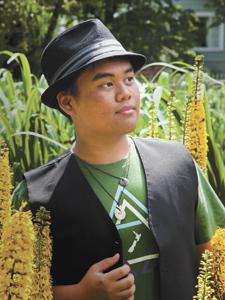
Gene Amos Figueroa. Credit: James Loewen
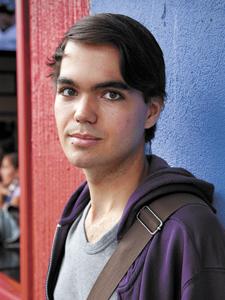
Kieran Kwiatkowski. Credit: James Loewen
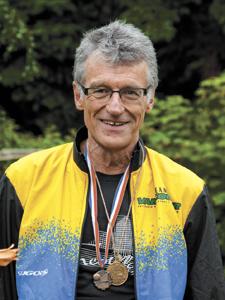
Richard Dopson. Credit: James Loewen
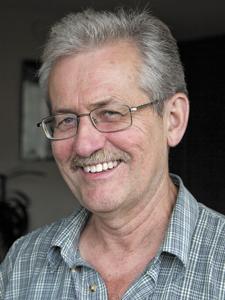
Don Hann. Credit: James Loewen
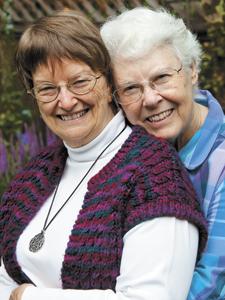
Christine Waymark with partner Robin Rennie. Credit: James Loewen
Andres Aguilera Martinez, 18
Tell us about your first Pride
It was only last Pride that I managed to go out and do something that far away from home on my own without my mother knowing, and so that was why I ended up doing it so late, at the age of 17.
I partly didn’t really like the idea of Pride. It felt a lot to me like sort of a minstrel show: just a bunch of people acting to entertain the straight people. I finally ended up doing it partly because I felt like it was sort of a rite of passage, partly because I wanted to hook up. I didn’t actually end up hooking up.
It wasn’t as big of a deal as I thought it would be. It was just kind of like any parade, just that the people were more colourful than any other parade I’d been to.
After that I started reading all the articles about gay-owned companies deciding not to join because prices started getting high, and all these other corporate companies joining for advertising reasons, and I was like, “Oh no.”
I might actually do some work for this Pride. The fact that I’m going to be part of it makes me feel like maybe it doesn’t have to be the way I saw it. Maybe I can help contribute in some way — because it really isn’t Pride itself but what it has become, or what Pride’s image has become.
I would like it to be not so much about putting on a show — make it more of a celebration than a show. It doesn’t have to become this sort of funereal procession but I’d like to see more substance.
***
Gene Amos Figueroa, 18
Are you excited?
I’m quite pumped! To get a feel of what it’s about, probably meet new people who are out already. I don’t know too many people who are out…
July 31 is actually the anniversary when I came out to my friends, and so I think it’s a special occasion.
I’m very new. I’m still in the process of telling my parents, because it’s a whole other story when it comes to family. Friends are a bit more comfortable than family, [where] it’s a bit more personal, I believe.
***
Kieran Kwiatkowski, 19
What does Pride mean to you?
I had just come out, and one of my friends said it would be a good experience to meet other people in the gay community. I was a bit nervous. I had never actually seen it before, so I really didn’t know what to expect.
The first time I was a spectator. For two [Prides] I was on a float with GAB [youth group].
I do find it very important because for most of the year I’m really busy and caught up in my own life, and when Pride comes around it’s just a great time to celebrate who we are.
I think it’s good for raising awareness and just to remember all the struggles we’ve had in the past. I think that as the years go by, it has to change to fit with the changing community. It seems like it’s turned more into just partying and less serious, and I think there still needs to be a serious side, just to be aware of the struggles that people go through in their day-to-day life.
I would like there to be more about the status of queer rights throughout the world — not to be overly sad or negative, but to bring more awareness.
***
Richard Dopson, 65
Tell us about your first Pride
I moved to Vancouver in 1975, and I first attended Pride with a brown bag over my head, in 1976.
I was a new school psychologist for the Vancouver School Board, and I knew there’d be media there, but I felt I didn’t want at that time to be publicly recognized because I didn’t know what the effect would be with my career.
I wanted to see what the event was. Out of curiosity, I went. When I was on permanent contract, I took the bag off my head. That was 1977.
At that time, the parade was very, very small, of course, but I credit Malcolm Crane for keeping the Pride parade going — he and Stan Weiss. Malcolm put his own money into the costs for the insurance and the policing. It was difficult because there wasn’t much community support, business support, financial support. He and Stan were totally invested in making sure that it continued and having it very public, coming right along Beach Ave and Sunset Beach, as it continues to.
When you’re facing the water, to the right of the Aquatic Centre, there is a bench dedicated to Malcolm Crane, and every year I go and sit on the bench and look down with pride at how Pride has developed over the years, and how huge it is now with all the entertainment and the booths. I purposely sit on the bench and think of how proud Malcolm would be to know that his dedication has resulted in this huge event. I get tingles just thinking about it, as I speak about it. I would encourage other people to sit on the bench and just feel gay history.
***
Don Hann, 65
When did Pride begin for you?
For me, gay pride celebrations began in the 1970s. I was a member of a civil rights organization called GATE Vancouver (Gay Alliance Toward Equality), which existed from 1971 to 1980.
I came out in 1971 in Newfoundland, so I had left the closet far, far behind by 1973, when I made it to Vancouver. I’d come out to my family; I’d come out to my friends. In 1975, I began to work in daycare and I came out at the daycare centre, so the closet wasn’t an issue for me, personally.
Once I was able to come out, I began to understand the oppressiveness of the society that I was living in. The thing to do then was become involved in civil rights organization and the drive for full civil rights, the drive to build community, working through GATE Vancouver.
This is the 40th anniversary of the gay civil rights movement. In the 1970s, the demonstrations were small, maybe a few hundred people. There was a huge iceberg — but there was a tiny tip you could see on the surface — of people who were out. Some people went to bars; they went to Lees Trail. Only a handful of people were actually prepared and did participate in the emergence of the civil rights movement in the ’70s.
Things were changing in other cities as well — San Francisco had 200,000 people in its Pride in the 1970s. That wasn’t the case in most cities in North America, or even in Europe. The risks were too great: you could get kicked out of your house, disowned by your family, lose your job. It took a long time and a worldwide movement to build things up to the point where you get the Pride celebrations that we’ve had in Vancouver. Those Pride celebrations have their origin in the political activity of the 1970s that turned the turf in so many ways — which allowed hundreds of thousands of people to come out of the closet and participate in these Pride events we see today.
I still go for a little while as a spectator. I still think it’s an important event. We need to maintain a sense of community, a sense of history, where we come from, and celebrate it every year. The struggle is by no means finished.
***
Christine Waymark, 71
What does Pride mean to you?
We went to a fairly early parade, and I remember once I got there I felt quite safe. It was, ‘Oh my God, I’m going to Pride.’
I was totally out — we’d been out ever since we’d been together — but it was a very visible way of making myself known. That was the ’80s.
I always like to do new things. Each time one of us would say, “Mmm, maybe not,” the other one would say, “But… but…”
I had heard more about Pride in other cities, like Toronto, and in fact, there was a slight disappointment that Vancouver’s was so little back then.
The ones I remember most were the ones where we started taking our grandchildren, in the early ’90s. I was on a scooter then. We’d get down there early and we’d carve out this space, right at the front. They liked the dykes on bikes.
The year we didn’t take them, it was, ‘We’re not going?!”
For quite a while I was in the parade with Qmunity. We’d have my granddaughter riding on the side of the scooter. The year that we got married, we had a “Just married” sign — that was 2004.
I think it’s important, partly because I think we could go backwards at any time, particularly with our governments in both province and country, but also because I think we deserve that kind of celebration. It is such a wonderful celebration of who we are, how diverse we are — and that we are, and proud.
I have some concerns: I think it needs to be kept no bigger than it is now. I really liked it when it was more folksy, but at the same time there is that sense of being recognized, that “Hey, these people actually want to be in our parade.” It’s a bit of a double-edged sword.
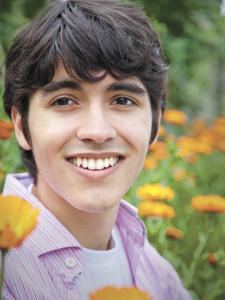

 Why you can trust Xtra
Why you can trust Xtra


